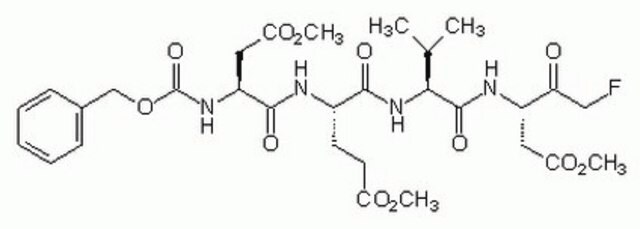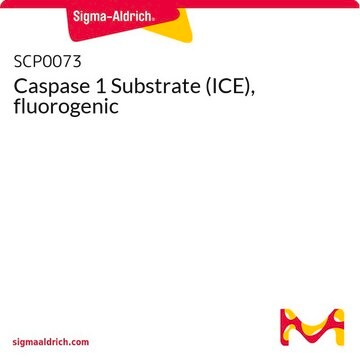400012
Caspase-1 Inhibitor II
The Caspase-1 Inhibitor II, also referenced under CAS 178603-78-6, controls the biological activity of Caspase-1. This small molecule/inhibitor is primarily used for Cancer applications.
Synonym(s):
Caspase-1 Inhibitor II, IL-1β Converting Enzyme (ICE) Inhibitor II, Ac-YVAD-CMK
About This Item
Recommended Products
Quality Level
Assay
≥95% (HPLC)
form
solid
manufacturer/tradename
Calbiochem®
storage condition
OK to freeze
desiccated
color
white
solubility
DMSO: 5 mg/mL
shipped in
ambient
storage temp.
−20°C
InChI
1S/C24H33ClN4O8/c1-12(2)21(24(37)26-13(3)22(35)28-17(10-20(33)34)19(32)11-25)29-23(36)18(27-14(4)30)9-15-5-7-16(31)8-6-15/h5-8,12-13,17-18,21,31H,9-11H2,1-4H3,(H,26,37)(H,27,30)(H,28,35)(H,29,36)(H,33,34)/t13-,17-,18-,21-/m0/s1
InChI key
UOUBHJRCKHLGFB-DGJUNBOTSA-N
General description
Biochem/physiol Actions
caspase-1
Warning
Sequence
Reconstitution
Other Notes
Garcia-Calvo, M., et al. 1998. J. Biol. Chem. 273, 32608.
Hilbi, H., et al. 1998. J. Biol. Chem. 273, 32895.
Thornberry, N.A., and Lazebnik, Y. 1998. Science 281, 1312.
Schlegel, J., et al. 1996. J. Biol. Chem.271, 1841.
Enari, M., et al. 1995. Nature375, 78.
Walker, N.P.C., et al. 1994. Cell78, 343.
Thornberry, N., et al. 1992. Nature356, 768.
Legal Information
Storage Class Code
11 - Combustible Solids
WGK
WGK 3
Flash Point(F)
Not applicable
Flash Point(C)
Not applicable
Certificates of Analysis (COA)
Search for Certificates of Analysis (COA) by entering the products Lot/Batch Number. Lot and Batch Numbers can be found on a product’s label following the words ‘Lot’ or ‘Batch’.
Already Own This Product?
Find documentation for the products that you have recently purchased in the Document Library.
Our team of scientists has experience in all areas of research including Life Science, Material Science, Chemical Synthesis, Chromatography, Analytical and many others.
Contact Technical Service








